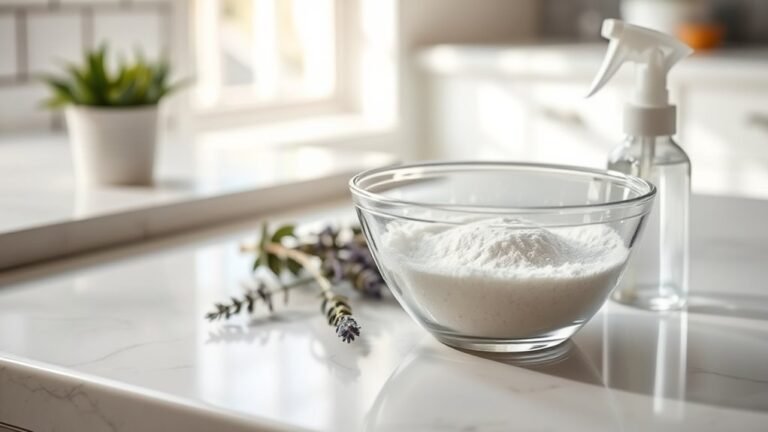Using Essential Oils to Clean Germs
You can use essential oils like tea tree and lavender to naturally clean germs in your home without harsh chemicals. Just mix 10-15 drops with water and vinegar for an all-purpose spray that fights bacteria and mold. Be sure to dilute properly to protect surfaces and skin, and test on small spots first. These oils freshen spaces while boosting your cleaning power. Keep exploring to find easy ways to make your home healthier with essential oils.
Benefits of Using Essential Oils for Cleaning

While you might be used to chemical cleaners, essential oils offer a natural alternative that’s both effective and safe. Choosing essential oils means embracing natural alternatives that protect your health and the environment. You’re not just cleaning—you’re making a conscious choice to avoid harsh chemicals that can harm your skin, lungs, and the planet. These oils provide eco friendly options that reduce your carbon footprint and minimize toxic waste. Plus, they bring a fresh, uplifting scent without synthetic fragrances. Using essential oils lets you reclaim control over what goes into your home, aligning with your values of freedom and wellness. By opting for these natural solutions, you’re supporting a cleaner, greener lifestyle that benefits both you and future generations.
Top Essential Oils With Antimicrobial Properties
Because essential oils come from plants known for their healing properties, many have powerful antimicrobial effects that make them perfect for cleaning. If you want to break free from harsh chemicals, lavender oil is a great choice. It not only smells amazing but also fights bacteria and fungi, keeping your space fresh and safe. Tea tree oil is another powerhouse; it’s widely recognized for its strong antimicrobial action, tackling germs and mold with ease. Using these oils lets you maintain a clean environment naturally, giving you the freedom to choose what touches your home. Embracing lavender oil and tea tree oil means you’re taking control of your health and surroundings without relying on synthetic cleaners. These essential oils offer an effective, natural path to a germ-free space.
How to Make Essential Oil Cleaning Solutions

Now that you know which oils pack the strongest antimicrobial punch, it’s easy to start making your own cleaning solutions at home. You can create powerful homemade cleaners by combining essential oil blends with simple ingredients like water, vinegar, or rubbing alcohol. For an all-purpose spray, mix 10-15 drops of your favorite antimicrobial oils—such as tea tree, eucalyptus, or lemon—with a cup of water and a tablespoon of white vinegar. Shake well before each use. Want something tougher? Add rubbing alcohol to boost disinfecting power. These blends give you freedom from harsh chemicals, letting you clean confidently and naturally. Experiment with scents and strengths to suit your space, knowing you’re in control of what goes into your home. Making your own essential oil cleaning solutions is straightforward and liberating.
Safe Practices for Using Essential Oils at Home
When using essential oils at home, you’ll want to make sure you dilute them properly to avoid skin irritation or damage to surfaces. It’s important to apply them safely, whether you’re cleaning or revitalizing the air. Let’s go over the best ways to handle and use these oils without any risks.
Proper Dilution Techniques
Although essential oils are powerful cleaners, you shouldn’t use them undiluted on surfaces or skin. Proper dilution techniques guarantee safety and effectiveness. Start by understanding recommended dilution ratios—usually 1-3% for cleaning solutions. This means adding just a few drops of essential oil per ounce of carrier liquid like water or vinegar. Using precise measurement tools, such as droppers or small measuring spoons, helps you get the right balance every time. Overconcentrating can damage surfaces or cause irritation, while too little oil won’t clean effectively. By sticking to proper dilution ratios and accurate measuring, you maintain control and freedom in your cleaning routine without risking harm. It’s a simple step that keeps your home germ-free and your essential oils working their best.
Safe Application Methods
Getting the dilution right is just one part of using essential oils safely at home. To truly harness their power without risk, you need to master application techniques that respect both your space and your skin. Always apply diluted oils to small areas first to check for sensitivity. Avoid direct contact with eyes or sensitive skin, and never use undiluted oils on your body. When cleaning surfaces, use a spray bottle to evenly disperse diluted oils, ensuring effective germ control without waste. Remember, safety precautions include storing oils out of children’s reach and avoiding inhalation of strong vapors for prolonged periods. By following these practical steps, you maintain your freedom to use essential oils confidently and effectively, keeping your home clean and safe.
Areas in the Home to Clean With Essential Oils

Several key areas in your home can benefit from the natural cleaning power of essential oils. These oils not only eliminate germs but also leave behind invigorating scents, making your space feel truly free and clean. Here are four spots where essential oils shine:
- Kitchen surfaces – Wipe down counters and cutting boards to fight bacteria and odors.
- Bathroom fixtures – Clean sinks, taps, and toilets to keep germs at bay without harsh chemicals.
- Living areas – Freshen upholstery and carpets by mixing oils with water for a natural spray.
- Door handles and light switches – High-touch points that collect germs, perfect for quick disinfecting.
Using essential oils in these areas empowers you to maintain a healthier home with less reliance on synthetic cleaners.
Tips for Enhancing the Effectiveness of Essential Oil Cleaners
When you want your essential oil cleaners to work their best, a few simple adjustments can make a big difference. First, experiment with your scent combination to boost both effectiveness and enjoyment. Blending oils like tea tree with lemon or eucalyptus can enhance antimicrobial power while leaving a fresh aroma. Don’t overlook cleaning frequency—regularly treating high-touch surfaces prevents germs from gaining a foothold and keeps your home safer. Also, guarantee you dilute oils properly; too little won’t disinfect well, and too much can cause irritation. Using warm water helps spread the oils evenly and activate their properties. Finally, always store your mixtures in dark glass bottles to preserve potency. These small steps give you freedom to clean naturally and confidently, maximizing your essential oil cleaners’ power.
Frequently Asked Questions
Can Essential Oils Replace Commercial Disinfectants Completely?
You might wonder if essential oils can completely replace commercial disinfectants. While they’re great natural alternatives, their effectiveness comparison shows they don’t always match the strong germ-killing power of chemical disinfectants. If you want freedom from harsh chemicals, essential oils offer a gentler option, but for thorough sanitation, especially in high-risk areas, you’ll still need conventional products. Balancing both can give you the best of both worlds.
How Long Do Essential Oil Cleaning Solutions Last?
You want freshness, you want potency, you want effectiveness—that’s what shelf life means for your essential oil cleaning solutions. Typically, they last about six months to a year if you store them right. Keep them in a cool, dark place, tightly sealed, away from sunlight and heat. By following these storage tips, you’ll maintain their power longer, giving you the freedom to clean naturally without constantly mixing new batches.
Are Essential Oils Safe to Use Around Pets?
When it comes to essential oils and pet safety, you need to be cautious. Not all essential oils are safe around your furry friends; some can cause serious health issues. You shouldn’t use oils like tea tree, eucalyptus, or citrus near pets. If you want the freedom to enjoy essential oils, always research each oil’s effects on pets and keep diffusers or sprays out of their reach to guarantee their well-being.
Can Essential Oils Cause Allergic Reactions During Cleaning?
Imagine a wildflower meadow—beautiful but sometimes hiding thorns. When you use essential oils for cleaning, you might awaken allergic symptoms like sneezing or skin irritation if you have essential oil sensitivity. You want to feel free and safe, so it’s smart to test oils on a small skin patch first and guarantee good ventilation. That way, you can enjoy nature’s scents without being caught off guard by hidden reactions.
Do Essential Oils Kill All Types of Household Germs?
You might wonder about essential oils’ effectiveness against all germ types. While they do have natural antibacterial and antifungal properties, they don’t kill every germ out there. Some viruses and tougher bacteria might resist them. So, if you want full freedom in your cleaning routine, it’s smart to combine essential oils with proven disinfectants. That way, you’re covering more ground and keeping your space truly clean and safe.






